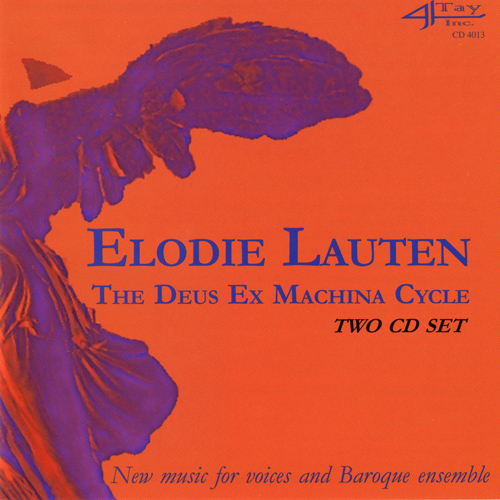Elodie Lauten (http://www.lesperformingarts.org/) is an original post-minimalist who writes piano, electronic, chamber and orchestral music. Her landmarks are neo-operas evolving or deconstructing the classic form: The Two-Cents Opera premiered in March 2009 at Theater for the New City; The Death of Don Juan reissued on CD by Unseen Worlds called “a masterpiece of new music” (2008), and Waking in New York from the poetry of Allen Ginsberg, listed on Sequenza21 as “one of the most influential works of the last three decades”.
| “There’s a compellingly ritualistic feel to the cycle; Lauten has found a kinship with the minimalists…a rich tapestry that discloses submerged patterns on repeated hearings”
– San Francisco Examiner “Deus Ex Machina…is a grand work that we are likely to return to again and again, combining post-minimal and pre-classical musics into a unified, spiritual whole, all colored by the use of 18th-century Velotti temperament…Lauten turns all to gold.” – 21st Century Music “The beauties of the entire work…are considerable.. There is very little that gives the recording away as being live, and the sound is very good. Recommended” – Fanfare Elodie Lauten’s “major opus, strikingly scored for Baroque ensemble with harpsichord, with the text chanted in a style reminiscent not of minimalism but of an exotic fusion of Stravinskian chinoiserie and the 17th century cantata: very beautiful.” Kyle Gann,The Village Voice New Music for Baroque Ensemble from this internationally renowned composer, in a stunning live performance from New York’s Merkin Hall, conducted by Mimi Stern-Wolfe and featuring harpsichordist Elaine Comparone, flutist Andrew Bolotowsky, baritone Thomas Buckner and many other star New York soloists. With inspiration and lyrics drawn from the words of Blaise Pascal, Steven Hall, Rainer Maria Rilke and Elodie Lauten herself, the Deus Ex Machina Cycle creates a unique sound world that grows out of what annotator John Schaefer calls “a synthesis of neo-Baroque and postminimalist musical styles”. This large-scale, two-part work is very moving, deeply felt in its conception andexceptionally beautiful. Elodie Lauten, whose Variations on the Orange Cycle was cited by Chamber Music Magazine as one of the 100 Reasons to Play This Century’s Music, has created a distinguished body of work that has been performed in her native Paris, the US and Canada. She has been hailed by the Village Voice as “a composer of enchanting music, one of the most individual voices of the present generation.” |
|||
|
